- Home
- Mordecai Richler
Joshua Then and Now Page 14
Joshua Then and Now Read online
Page 14
De par le roi, défense à Dieu
De faire miracle en ce lieu
Spain was close, achingly close, but, overwhelmed by Paris, he was unable to budge. He met Markham, he picked up with Peabody. Then, one afternoon in the autumn of 1951, he found himself sitting out there with Peabody on the terrace of The Old Navy.
“Try Ibiza.”
“Ibiza?”
“Ibiza.”
He yawned.
“You cross the Pyrenees,” Peabody said, “and you’re leaving Europe behind you. Those mountains are a time machine. On the other side, it’s a hundred years ago. Much more in some places.”
Spain beckoned. Yes. But by this time he had already blown most of his stake, some of it on the horses at Longchamps and Maison Lafitte, the biggest chunk in one wild drunken night with Peabody at the roulette tables in a club near l’Opéra. So he set out for London instead, where he would at least be able to find work without a labor permit. Clippings in hand, he made the rounds. Reuters, UP, AP, CP. He filled in on somebody’s vacation on a desk here, subbed somewhere else for a fortnight, and served as a stringer for a number of Canadian newspapers, filing the obligatory crap. If, for instance, a dumpy Canadian actress had a walk-on part in a play on Shaftesbury Avenue, he would write TORONTO BEAUTY DAZZLES WEST END. He also turned to plagiarism. Ripping a short story with a twist in its tail from Collier’s, he rewrote it, setting it in Calgary, and sent it off to the Toronto Star Weekly with a covering letter saying he was a struggling Canadian artist, who simply refused to sell his proud heritage for a fistful of Yankee dollars. The enclosed story had been accepted by the Saturday Evening Post, if only he agreed to make the place-names American. This, he wrote, would be a violation of his integrity; he would rather accept less money from a Canadian publication. And, to his surprise, the story earned him a check for $300, and a request for more. Then he was asked by a Montreal editor to go to Cambridge and send them 750 words on Canadian students for an educational supplement.
Cambridge. Everywhere he looked, bats on bicycles. Rotten teeth. But there, on a wet misty Saturday morning in the Market Square, he first encountered Murdoch, literally bumping into him as they were both riffling David’s Bookstall for early Penguins, ancient Everymans, costing no more than sixpence each. In those days the yet-to-be-published Murdoch still read other people’s novels in anticipation of pleasure, and Joshua did not yet take them as fodder for his scabrous reviews, outbidding everybody in invective. Joshua picked up a hardback, a novel published in 1934, and the reviewers’ quotes on the faded jacket were dazzling. “Not to be missed.” “A minor masterpiece. Brilliant.” He had never heard of the author.
Murdoch, with his gift for anticipating what others thought, grinned at him. “It’s a mug’s game,” he said.
Joshua read the first paragraph aloud, they both guffawed, and repaired to Morley’s for a pint.
Soul-mates.
Murdoch was still wiry then, National Health steel-rims riding his fussy nose, mop of greasy black hair, brown eyes amazed, his tweed jacket the standard utility wear. Already pumping wild-eyed energy and malice out of every pore. “Now tell me, who is this Adlai Badly chap they are all talking about so much over there?”
A council school boy from Bradford, a scholarship lad, Murdoch was to earn a double first at King’s. Once, when they stopped there to collect his mail, he asked Joshua to wait outside the porter’s gate. “Sorry,” he said, “but you’re not a member of the college. Indeed, you are my social inferior in every respect.”
“A rare advantage for you, that, Sidney.”
“If you only knew,” he replied, grinning.
But later he retreated into melancholy. “Do you think there’ll be a place for us?” he asked.
“Where?”
“In this world, is where. I won’t stand in queues. I am not going to eat in restaurants that accept luncheon vouchers. Or keep a post office account. I want everything.”
“We’re going to have it, Sidney.”
“You don’t understand this wretched country. It’s not enough to win a double first. It’s pushy.”
“We’re special.”
“Bless you. But you don’t understand. If I won a Nobel Prize, the Times headline would read, ‘Newsagent’s Boy Wins …’ And where, in God’s name,” he asked, rounding on Joshua, “do you get your confidence?”
Joshua unbuttoned his shirt to reveal a long thin key from a silvery chain.
“What’s that?”
“It’s the key to a box which is in the Royal Bank of Canada on the main street of Cornwall just across the Ontario border.”
“Seriously, Joshua, how come you’re so sure of yourself?”
Me, sure of myself. He had to laugh. “Well,” he said, “I’ll tell you. When I was a kid, my father used to take me out walking downtown, and whenever we ran into somebody he knew, he’d stop him and say, ‘I’d like you to meet my son, Joshua. This is my boy.’ And when I was old enough, he took me to meet Colucci in the La Scala Barbershop, and he said, ‘Your days are numbered, Sonny.’ ‘How come?’ Colucci asked. ‘This is my boy, Joshua, now you just feel that muscle.’ My father wasn’t in town for my bar-mitzvah, he had business elsewhere, but when he got back he took me into his poolroom, marched me over to the rack, handed me a key, and said, ‘This will unlock your cue. It’s yours. Nobody else can use it.’ Then he turned to the boss and said, ‘Off your ass, Stash, and rack ’em up for me and my son here.’ ”
“What do you want, Joshua, really want?”
“Well, my father brought me up to believe I would only be making one trip round. So I want a good life, available on terms that do not offend me. I also intend to enjoy myself.”
Joanna, a fetching Girton girl, smelling of old money and country houses, came between them. She failed to grasp that Murdoch’s insults were a desperate form of courtship and so did Joshua, at the time. He hit it off with Joanna and called at Murdoch’s rooms to ask if he might have the run of the place for the afternoon. “Certainly,” Murdoch said stiffly, and when Joshua returned with Joanna he found that he had left them a bottle of Australian sherry and an envelope with Joshua’s name on it. Inside there was a nasty note. Murdoch had also contrived to disconnect the gas fire, something Joshua reproached him for when he caught up with him later at Morley’s.
“Never mind that. What did you do?” Murdoch demanded, flushed. “How does one go about it?”
“About what, my dear?”
“You know, the funny stuff.”
Joshua ordered another pint, wincing when somebody accidentally brushed against his back at the bar.
“What’s wrong?” Murdoch asked.
Lowering his voice, Joshua said, “Scratches.”
“Good God, really?”
“Mn.”
“Was she wearing garters? I’m absolutely bonkers about suspender belts. Well?”
“That,” Joshua said, “would be indiscreet.”
Sodden, reduced to a child again, Murdoch confessed that he had yearned for Joanna for months, but hadn’t known how or if she would ever … “How do you start it?”
Unwilling to admit that they had done no more than grope at each other, both of them goosepimply and shivering in Murdoch’s subarctic room, Joshua said, “Well, it began with her sucking my toes. It’s an old Orthodox Jewish custom, don’t you know?”
“Go to hell.”
“Just how much,” Joshua asked slyly, “do you know about what really goes on at a bar-mitzvah ceremony?”
Early the next morning a flustered Joanna was pounding on Murdoch’s door. With his help, she turned over pillows, rolled back carpets, and moved furniture, hunting everywhere, even behind book-cases, for her pearl necklace. It wasn’t to be found anywhere. Murdoch, when Joshua ran into him later in the day, was most distressed. “They weren’t fake, you know,” he said. “They came from Asprey’s.”
“The strand probably broke,” Joshua said, “and she lost them cycling b
ack to Girton.”
Joanna placed an ad in the evening paper. It ran for three days, but nothing came of it. Joshua returned to Paris, consulted with Peabody about Ibiza, and bought a third-class rail ticket to Seville.
He had to see Seville. On July 18, 1936, there had been an amazing coup de main. General Queipi de Llano, commander of the carbineers, accompanied by his ADC, with only three other officers and fifteen Falangists at his disposal, audaciously arrested officers loyal to the Republic and took over the infantry barracks. This put a regiment of a mere hundred and thirty soldiers under his command, a city of a quarter-of-a-million yet to be subdued. Fortunately for Llano, the artillery barracks agreed to support the uprising, the airport fell, and then only the working-class suburbs resisted the insurrection.
The stars are dead; the animals will not look:
We are left alone with our day, and the time is short and
History to the defeated
May say Alas but cannot help or pardon.
From Seville, he hitchhiked to Granada. Coming out of the Sierras at Motril, Joshua joined the main road from Malaga, and now, just as he had planned, he was following the route of the retreating republican army On January 17, 1937, he remembered, the nationalist attack on Malaga had been spearheaded by mechanized Italian units. Two German cruisers shelled the coastal city daily and, on February 6, as the pride of the Canadiens, Howie Morenz, lay in a hospital bed and Joe Louis signed to meet Tommy Farr, the civilian population was ordered to evacuate, following the road to Almeria. In Ronda, republican zealots threw several hundred of the local bourgeoisie over a clifftop to their deaths. Meanwhile, pursuing nationalist troops, supported by tanks and aircraft, massacred stragglers in the retreating republican column. On this road, Joshua, this very road. The men were killed, but the women spared, if only to add to the Republic’s food crisis. Dr. Norman Bethune was there. For three days and three nights, he and three other men ferried survivors to Almeria.
… the further we went the more pitiful the sights became. Thousands of children – we counted five thousand under ten years of age – and at least one thousand of them barefoot and many of them clad only in a single garment. They were slung over their mother’s shoulders or clung to her hands. Here a father staggered along with two children of one and two years of age on his back in addition to carrying pots and pans or some treasured possession.…
A few evenings later, when Almeria was choked with refugees, some forty thousand people having reached what they believed to be a haven, the city was heavily bombed by German and Italian airplanes. The airplanes made no attempt to hit the government battleship in the harbor or bomb the barracks, but deliberately dropped bombs in the very center of the town, where the exhausted refugees were gathered. While I, Joshua thought, was learning to play bolo and cheering on Boston’s Kraut Line: Milt Schmidt, Bobby Bauer, Woody Dumart.
Tourists, Joshua discovered, were rare in Spain in 1952, especially footloose young Canadians, and he was amazed, after having endured the grasping French, to find himself treated as a guest everywhere he wandered in Almeria, even bartenders standing him to drinks. Como su casa.
Barcelona.
There seemed, at first glance, to be a few of the very, very rich in Barcelona, many who were unspeakably poor, but hardly any middle class to speak of. The rich, he discovered, were for the most part vastly entertaining fellows who had never done a day’s work in their lives and were offended by the very notion of it. Oblomovs abounded. Among them, the engaging but mindless Antonio, who wore a Savile Row suit and drove a sparkling white Austin-Healey. “Given the benefit of a couple of drinks,” Antonio said, “we’re all republicans here. A few more stiff ones, and we’re Communists. But come four o’clock in the morning, man, every self-respecting Spaniard is an anarchist. So we need Franco, don’t you see?”
Yes. Certainly. And the next evening Joshua sailed for Ibiza.
9
UNTIL PAULINE WAS CONFINED TO A BED IN THE ROYAL Vic, adrift on Valium, Joshua had been able to enjoy himself in Montreal even in the pit of winter, out tramping the streets at night, the snow heaped everywhere, the black trees bare. Ears stinging, squeaking powdery snow underfoot, he would ascend the mountain into Upper Westmount, pausing here and there to peer boldly into living room windows, watching families gathered round their crackling fireplaces, proof against icy blasts, playing back the day’s events to each other or maybe perusing spring seed catalogues, planning a better garden. But what he enjoyed most of all was seeking out old classmates to bait. St. Urbain urchins who had struck it rich. Especially Pinsky. Irving Pinsky. “If you need maybe a fire,” Pinsky used to say in the schoolyard, “my father says Shapiro’s the man. What a yold.” Pinsky, now a dentist, lived on Summit Circle and could be found there most nights out walking his Russian wolfhound.
“Joshua, what are you doing here?”
“I come up here for the fresh air, Irving. You have no idea how it stinks down below. We even have niggers on our street.”
“You’re supposed to say ‘blacks’ now. How would you like to be called a kike?”
“I’m a Jew, Irving, you’re a kike.”
“Well, you haven’t changed.”
Which was more than he could say for Pinsky. Pimply, scrawny Pinsky had matured into a slender man with curly gray hair. Whiskyad distinguished. He wore his Persian lamb hat at a perky angle, a black cashmere overcoat, a silk scarf, kid gloves, suede fur-lined boots. A world traveler now, he knew what to order for breakfast at Brennan’s in New Orleans, just the right fellow to deal with at Davidoff’s in Geneva, the first day forced Kent asparagus became available at the Guinea in London. He also considered himself something of a lady’s man. And only a month after Joshua and Pauline moved into their house, Pinsky, who had been introduced to Pauline at a concert, saw her waiting by a bus stop. He pulled up in his Mercedes 450SL and offered her a lift downtown. Pauline accepted, joking with Joshua about it. Encouraged, Pinsky phoned the following week to invite them to dinner on Tuesday.
“And how,” Pinsky asked Joshua, the moment he had served drinks, “did a guy like you manage to catch such a lovely wife?”
“Why, thank you,” Pauline said, driving her elbow into Joshua’s ribs.
Pinsky belonged to a gourmet club. He collected vintage wines. And so it was first-rate fare they ate with him and his striving wife, Gilda, off a Belgian lace tablecloth. Irving Pinsky, once celebrated for the sneakers he let rip in Room 42, FFHS, now resplendent in a burgundy velvet dinner jacket worn over a black turtleneck sweater, Gilda’s slack plump arms clattering with gold bands and bracelets. Their faces reflected in the dancing light of silver candlesticks, they drank wine served up in tinted goblets, twenty-five-year-old cognac coming in birdbath-size snifters. But before they even sat down to dinner, Pinsky took them down to inspect his wine cellar, brushing unnecessarily against Pauline on the stairs. They passed through a laundry room, with its twin tubs, into the sanctuary, its up-to-date thermostat set at 13° Celsius. And here a glowing Pinsky allowed a fulminating Joshua to fondle, warning him not to shake unduly, his cherished bottles of Chateau Mouton-Rothschild ’61 and Chateau Lafite ’66. A leatherbound ledger stood open on a bible stand which had been retrieved from a Lisbon antique shop, and here every bottle was entered, the date of its removal noted, as well as a few pertinent remarks about its body and texture. For future reference. Proffering a bottle of Forster Kirchenstuck ’67, Pinsky asked, “Guess what this baby’s worth on today’s market?”
“Why, I’d say at least twenty-five bucks.”
“More like a hundred,” Pinsky said, quivering with delight. “Ask your absolutely enchanting wife, she’d know.”
After they got home, an amused Pauline told him, “When you went to the toilet, he asked me if I’d like to have lunch with him.”
The next time Joshua encountered Pinsky, out walking his Russian wolfhound, it was the day after Pinsky had returned from his winter retreat at an exquisite little hote
l on a remote and as-yet-undiscovered West Indian isle. Fear and trembling showed beneath his taut tanned flesh. “Haven’t you heard?” he asked.
“No. What?”
“It’s terrible. Unspeakable. I’ve been burglarized.”
“What did they take?”
“Nothing.”
“Nothing?”
“Worse. Come,” he said, grieving.
Pinsky led him back to the house and right down to the cellar. “Look at this,” he said. “And this. And this,” thrusting one precious bottle after another at him.
All Joshua could think to say was, “They’re not as dusty as they were the last time I was here.”
“Prick. Look at this.”
“Oh, my God, there’s no label.”
“Some snake, some pervert, has washed the fucking label off every fucking bottle. The bastard has also moved the bottles around in the racks.”
“I hope you’re insured, Irving.”
“Of course I’m insured. But what can I claim? The police – they sent some jerk of a detective called McMaster here – say nothing’s been stolen. Imagine anybody doing such a thing to me. Why, I keep asking myself.”
“Fortunately, a man with your educated palate could open any one of these bottles and tell not only the vineyard, but the vintage.”
“Certainly. But how would I know which one to open?”
“Red with meat. White for fish.”
“I wish I had your simple tastes.”

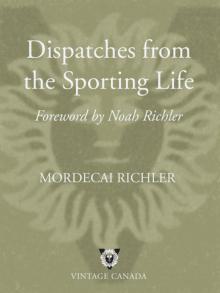 Dispatches From the Sporting Life
Dispatches From the Sporting Life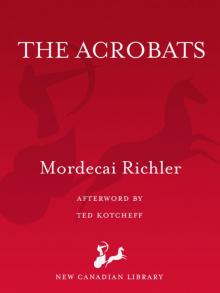 The Acrobats
The Acrobats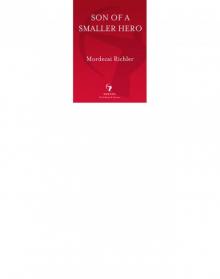 Son of a Smaller Hero
Son of a Smaller Hero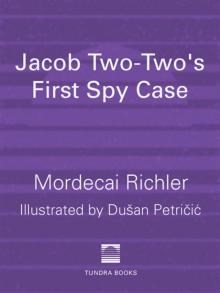 Jacob Two-Two-'S First Spy Case
Jacob Two-Two-'S First Spy Case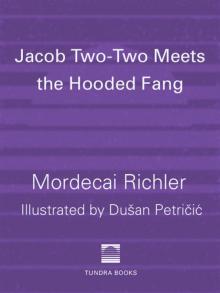 Jacob Two-Two Meets the Hooded Fang
Jacob Two-Two Meets the Hooded Fang Jacob Two-Two and the Dinosaur
Jacob Two-Two and the Dinosaur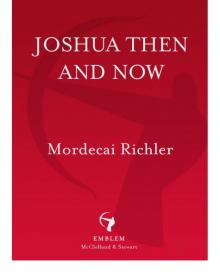 Joshua Then and Now
Joshua Then and Now Solomon Gursky Was Here
Solomon Gursky Was Here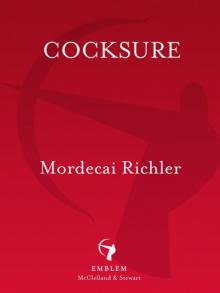 Cocksure
Cocksure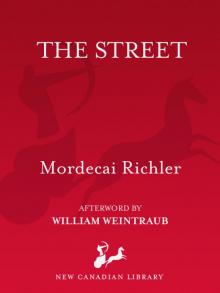 The Street
The Street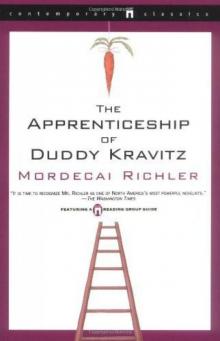 The Apprenticeship of Duddy Kravitz
The Apprenticeship of Duddy Kravitz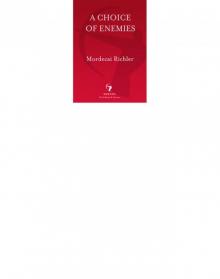 A Choice of Enemies
A Choice of Enemies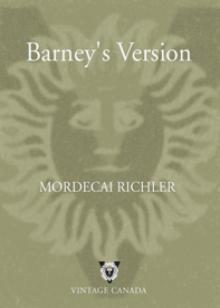 Barney's Version (Movie Tie-In Edition)
Barney's Version (Movie Tie-In Edition)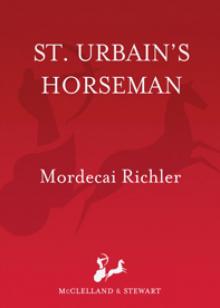 St. Urbain's Horseman
St. Urbain's Horseman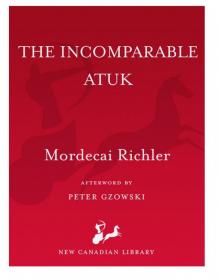 The Incomparable Atuk
The Incomparable Atuk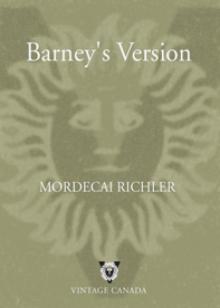 Barney's Version
Barney's Version